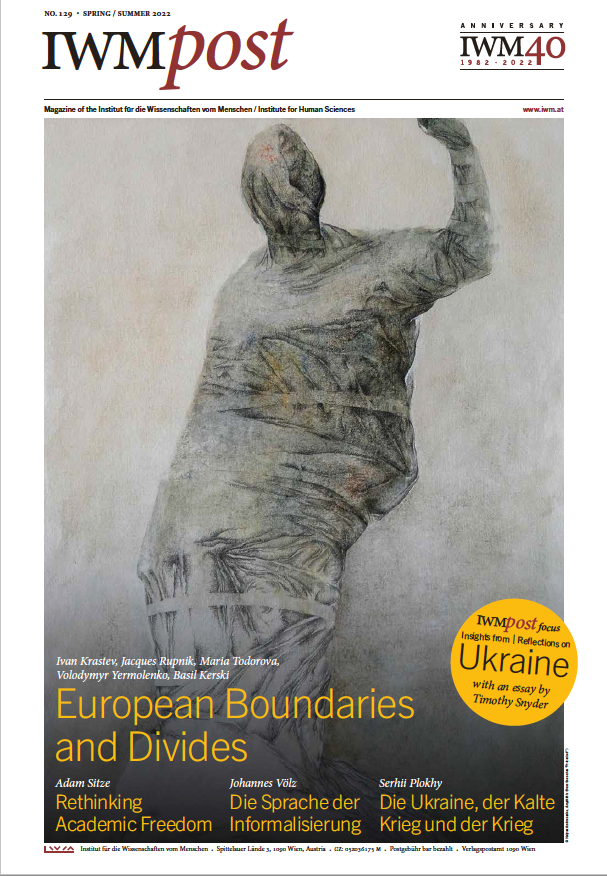We intended to celebrate – IWMpost 129 was to contain a supplement for the fortieth anniversary of the IWM. However, since Russia’s invasion of Ukraine, we no longer felt like celebrating. Thus, we decided to dedicate the supplement to Ukraine instead. The guiding maxim of the supplement’s editor, Permanent Fellow Kate Younger: If we want to understand what is at stake in Ukraine today, not only for Ukrainians but for all of us, the only place to start is to listen to Ukrainians. With the exceptions of Timothy Snyder and the editor herself, all contributions to the supplement are penned by former or current fellows of the program Ukraine in European Dialogue. The creators of the photographs and artwork illustrating the articles are also from Ukraine.
From the originally envisaged anniversary supplement, we decided to include in the regular issue only the focus on “European boundaries and divides.” Permanent Fellow Ivan Krastev and Volodymyr Yermolenko address the question of Europe’s borders against the backdrop of the war, each from a different perspective. Jacques Rupnik and Maria Todorova, for their part, discuss the relevance of two categories that enjoyed great prominence in the first post-socialist decade: “Central Europe” and “the Balkans.” Finally, Basil Kerski’s essay points to the often neglected transnational and European dimension of the Solidarność movement.
The remainder of IWMpost 129 displays a variety of topics as well as a diversity of entry points and disciplinary approaches. Some of the essays address issues of democratic decline (Gniazdowski, Sitze, Völz, Regatieri, Schwartz), others deal with implications of the Cold War (Plokhy, Dodd), questions of art and museum exhibitions (Glanc, Kostro), Israel’s international relations, and migration in the Global South (Aung, Acosta, Sur). Hannes Werthner’s essay on digital humanism introduces a new and promising research focus at the IWM. Finally, the IWM new rector, Misha Glenny, introduces himself.
I hope you enjoy the read.
Evangelos Karagiannis
Download IWMpost 129 as a PDF
Content
40th Anniversary of the IWM—European Boundaries and Divides
Reimagining the East-West Divide in Europe / by Ivan Krastev
Central Europe Lost & Found / by Jacques Rupnik
Do the Balkans exist? / by Maria Todorova
Ukraine and the Borders of Europe / by Volodymyr Yermolenko
Europäische Träume: Solidarność und die Einheit Europas / von Basil Kerski
War and Cold War
Some Reflections on Philosophy Yesterday and Today / by James Dodd
Die Ukraine, der Kalte Krieg und der Krieg / Kate Younger im Gespräch mit Serhii Plokhy
The Art of Exhibition
Ausstellungen in der Kriegszeit / von Tomáš Glanc
Museums and European history / by Robert Kostro
Democratic Decline
Veräußerlichkeit der Freiheit / von Andrzej Gniazdowski
Rethinking Academic Freedom / by Adam Sitze
„Locker Room Talk“: Die Sprache der Informalisierung / von Johannes Völz
Elemente des neuen Autoritarismus in Brasilien / von Ricardo Pagliuso Regatieri
What Do Non-Voters Want? / by Madeleine Schwartz
Israel
Austria and Israel: On Memory and International Relations / by Noga Sagi
The Israeli reaction to the War in Ukraine / by Merav Amir
Migration in the Global South
Solidarität & Empowerment: Eine besondere Kooperative in Kolkata / von Rajat Kanti Sur
Asia’s Frontiers: Who Moves, and Who Does Not? / by Geoffrey Aung
Freizügigkeitsabkommen und globale Mobilität / von Diego Acosta
Digital Humanism
Digitaler Humanismus / von Hannes Werthner
Welcome
Zurück zu den Anfängen / von Misha Glenny
Editorial / Insights From Ukraine
Taking Ukraine Seriously / by Katherine Younger
Insights From Ukraine
Z – Putins Krieg der Welten / von Vasyl Cherepanyn
Ein „besonderes Verhältnis“ und die Notwendigkeit, es umzudenken / von Kyrylo Tkachenko
Soviet “Experiments” with History / by Oksana Klymenko
Der Krieg in der Ukraine ist ein Kolonialkrieg / von Timothy Snyder
Life Beyond the Center: Lessons from the War in Ukraine / by Daria Badior and Anastasiia Platonova
Reflections On Ukraine
“Russian Minority in Donbas” and the History of the Majority / by Yulia Abibok
Freedom Is an Identity / by Kateryna Iakovlenko
Sprache und Krieg / von Volodymyr Rafeyenko
Fans / von Natalka Vorozhbyt
